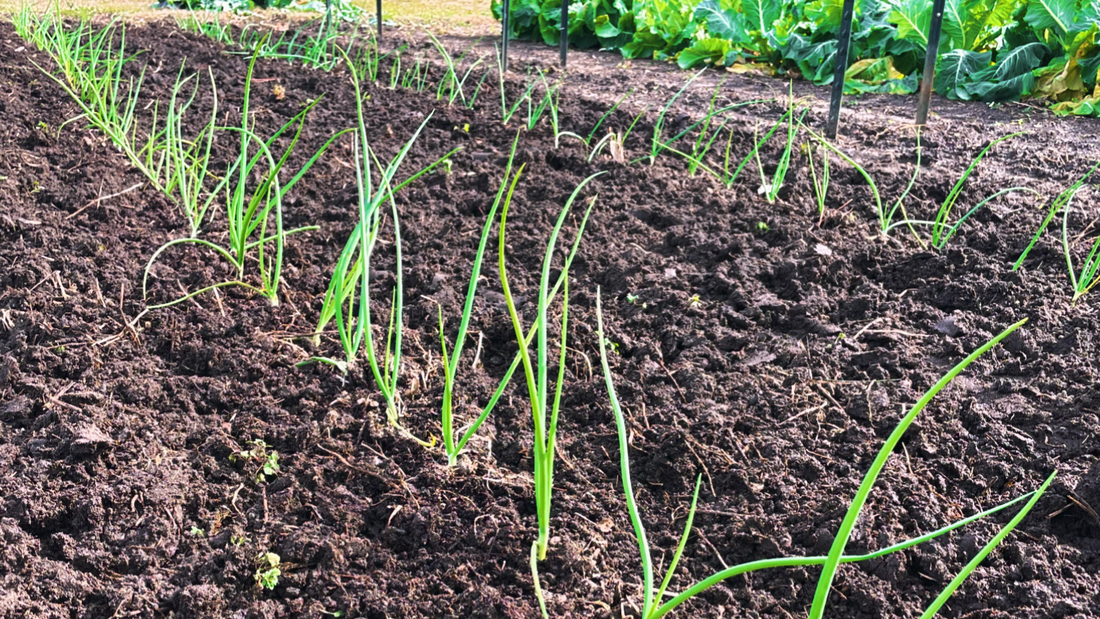As we've discussed in other blogs, onions are what we like to call "heavy feeders." This means that you really have to pump the nutrients to them to get grow big onions. This also means that they're hard to over-fertilize and you can really push the limits of fertility without hurting the plants.
We feed onions a balanced fertilizer initially, starting with an application of Coop Gro at planting and then a couple applications of AgroThrive within the first month or two of transplanting. But once they start growing well, that's when we want to really pump the nitrogen to them.
When choosing a good fertilizer for onions, you'll want to make sure the first number in the fertilizer analysis is significantly higher than the other numbers. This means the fertilizer has a higher percentage of nitrogen, which onions love! Below we'll discuss some organic and synthetic options for giving your onions the nitrogen they need.

Organic Onion Fertilizers
1) Nature Safe 13-0-0
This is a great organic fertilizer that includes blood meal, feather meal, and meat meal. We've used it successfully on corn and onions over the years. It can be a little difficult to find locally. But if you can get your hands on some, it's good stuff!
2) Blood Meal
Blood meal usually has an analysis of 12-0-0 or 13-0-0, which is perfect for feeding onions. It works relatively-fast for an organic nitrogen source and feeds plants well.
3) Feather Meal
Like blood meal, feather meal usually has an analysis of 13-0-0. It provides a nice slow release of nitrogen to feed onions as they grow.
4) Guano
There are many different brands of guano-based fertilizers out there, so you have to look at the analysis on this one. Some guano fertilizers are more balanced than heavy on the nitrogen. But find one that's heavy on the nitrogen, and it will feed your onions well.
Unlike the other three mentioned above, guano is usually sold in a liquid formulation. This means you'd want to mix it with water and pour alongside the plants, as opposed to sprinkling it along the row like you would with the blood meal and feather meal.

Synthetic Onion Fertilizers
1) Sodium Nitrate
Also called Chilean Nitrate, this is a fast-acting nitrogen source for heavy feeders. I put this one in the "synthetic" category, but you can find organic versions of sodium nitrate. Just be careful with this one, as you can create some salt accumulation issues in your soil if you overuse it.
2) Calcium Nitrate
I usually don't think of onions as a vegetable that needs extra calcium, but you can use calcium nitrate to feed them. Calcium nitrate is frequently used on tomatoes, peppers, and eggplant to help with blossom end rot. But if you have some calcium nitrate on hand, you can certainly use it on onions.
3) Ammonium Sulfate
This is a good one if you want to add a little extra "bite" to your onions. Sulfur is what causes onions to have that spicy, pungent flavor. So if you want full flavor onions, this is a good synthetic option to feed them fast.
4) Urea
You have to be a little careful with this one because it's so "hot," but it will definitely give your onions a pop! Urea usually has an analysis around 46-0-0, so it's packed full of nitrogen.
Are There Any Downsides to Synthetic Fertilizers
Although the synthetic options listed above will feed onions faster than the organic options, there are a few downsides to using synthetic fertilizers heavily on onions. There is the salt accumulation issue I mentioned above, which is why you don't want to solely rely on these synthetic options.
There's also the weed issue. Many weeds thrive on synthetic forms of nitrogen in the soil. If you're using synthetic fertilizers on onions, be prepared to fight the weeds more. This isn't a deal-breaker for most synthetic users, but something you should know.

How Often to Apply?
Before we implemented our chicken tractor grazing system, we would side dress onions two to three times during their vegetative growth phase. But now that we've got the chickens helping us, we've found that we can reduce the number of nitrogen applications to one or two.
When grazing cover crops prior to planting onions, the chickens do a great job helping to boost soil fertility. This sustainable system reduces our fertilizer inputs, saves money on feed costs, and helps build our soils.
But if you don't have a chicken tractor or a good animal manure source, you'll probably want to give your onions two to three doses of nitrogen. The good thing about onions is that it's hard to over fertilize them. You can push them as hard as you want, depending on how much you want to invest in them. The main thing to remember is that they need that extra nitrogen to make some big ones!

